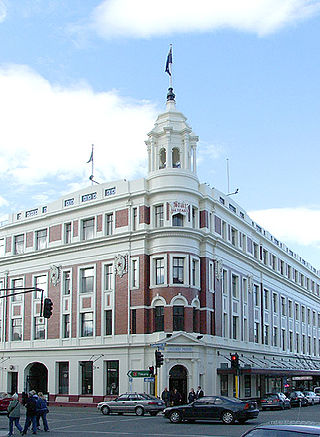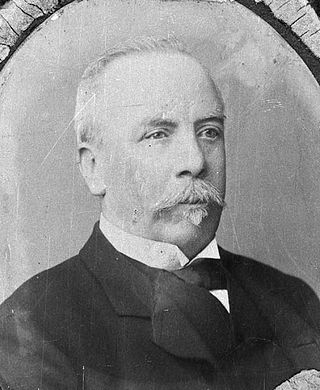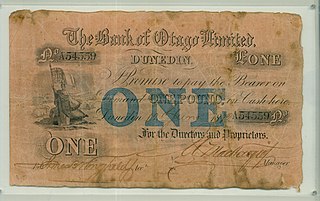Related Research Articles

The Otago Daily Times (ODT) is a newspaper published by Allied Press Ltd in Dunedin, New Zealand. The ODT is one of the country's four main daily newspapers, serving the southern South Island with a circulation of around 26,000 and a combined print and digital annual audience of 304,000. Founded in 1861 it is New Zealand's oldest surviving daily newspaper – Christchurch's The Press, six months older, was a weekly paper until March 1863.

William James Mudie Larnach was a New Zealand businessman and politician. He is known for his extravagant incomplete house near Dunedin called Larnach's castle by his opponents and now known as Larnach Castle. He is also remembered for his suicide within parliament buildings when faced with bankruptcy and consequent loss of his seat in parliament.

Thomas Bannatyne Gillies was a 19th-century New Zealand lawyer, judge and politician.

Thomas Dick was a 19th-century New Zealand politician. Originally a merchant, he worked in London and then represented his firm on Saint Helena for seven years. From there, he was sent to Dunedin as the company's representative; he emigrated with an extended family. He soon became involved in politics and was Superintendent of Otago Province from 1865 until 1867. Over a period of 24 years, he represented various Dunedin electorates in Parliament and was Colonial Secretary (1880–1884), Minister of Justice from 1881 to 1882, and Minister of Education from 1881 to 1884. A deeply religious man, he was involved in many church affairs. He was one of the founders of Hanover Street Baptist Church; the building is now classified as Category I by Heritage New Zealand.

William Downie Stewart was a 19th-century New Zealand politician and a lawyer.
The Gold Fields District electorate was a 19th-century parliamentary electorate in the Otago region, New Zealand. It was created in 1862, with the first elections in the following year, and it returned two members. It was one of eventually three special interest constituencies created to meet the needs of gold miners. All three of these electorates were abolished in 1870. A unique feature of the Gold Fields District was that it was superimposed over other electorates, and voting was open to those who had held a mining license for some time. As such, suffrage was more relaxed than elsewhere in New Zealand, as voting was otherwise tied to property ownership. Another feature unique to the gold mining electorates was that no electoral rolls were prepared, but voting could be done upon showing a complying miner's license.
City of Dunedin, during the first two parliaments called Town of Dunedin, was a parliamentary electorate in Dunedin in Otago, New Zealand. It was one of the original electorates created in 1853 and existed, with two breaks, until 1905. The first break, from 1862 to 1866, was caused by an influx of people through the Otago Gold Rush, when many new electorates were formed in Otago. The second break occurred from 1881 to 1890. It was the only New Zealand electorate that was created as a single-member, two-member and three member electorate.
Dunedin and Suburbs South was a parliamentary electorate in the city of Dunedin in Otago, New Zealand from 1862 to 1866. From 1863 it was a multi-member electorate.
James Paterson was a 19th-century Member of Parliament in Otago, New Zealand. He was a cabinet minister, and on the Legislative Council.
The 3rd New Zealand Parliament was a term of the Parliament of New Zealand. Elections for this term were held between 12 December 1860 and 28 March 1861 in 43 electorates to elect 53 MPs. Two electorates were added to this during this term, Gold Fields District and a new Dunedin electorate created by splitting the existing City of Dunedin into Dunedin and Suburbs North and Dunedin and Suburbs South, increasing the number of MPs to 57. During the term of this Parliament, six Ministries were in power.
William Baldwin, born John Baldwin was a 19th-century Member of Parliament in the Otago region of New Zealand.
George Hepburn was a 19th-century Member of Parliament from Otago, New Zealand. Born in Scotland he emigrated to New Zealand in 1850. He first entered politics by serving on the Provincial Council of Otago from 1855 to 1865 before he was elected to the New Zealand House of Representatives as member for Roslyn in 1866.
The New Zealand Constitution Act 1852 authorised the General Assembly to establish new electoral districts and to alter the boundaries of, or abolish, existing districts whenever this was deemed necessary. The rapid growth of New Zealand's European population in the early years of representative government meant changes to electoral districts were implemented frequently, both at general elections, and on four occasions as supplementary elections within the lifetime of a parliament.
The Bruce by-election 1862 was a by-election held in the multi-member Bruce electorate during the 3rd New Zealand Parliament, on 31 July 1862. The by-election was caused by the death of incumbent MP Charles Kettle on 5 June, and was won by Edward Cargill.
The April 1865 Bruce by-election was a New Zealand by-election held in the multi-member electorate of Bruce during the 3rd New Zealand Parliament on 8 April 1865. It was triggered on 9 January that year by the resignation of separationist Thomas Gillies and won by prominent settler Arthur John Burns. The more liberal businessman William John Dyer was the sole other contester of the by-election, finishing with 43.33% of the vote.
The 1862 City of Dunedin by-elections were three by-elections held in the City of Dunedin electorate in Dunedin following three resignations.
The 1869 City of Dunedin by-election was a by-election held on 5 March 1869 in the City of Dunedin electorate in Dunedin during the 4th New Zealand Parliament.
The 1863 Dunedin and Suburbs South by-election was a by-election held on 20 June 1876 in the Dunedin and Suburbs South electorate during the 3rd New Zealand Parliament. It was then a two-member electorate; the other member being William Reynolds.
The 1879 City of Dunedin by-election was a by-election held on 15 July 1879 in the City of Dunedin electorate in Dunedin during the 6th New Zealand Parliament.

The Bank of Otago was a bank which successfully operated in New Zealand's Otago province from late 1863 until it was bought in 1873 by a new London incorporation, The National Bank of New Zealand, also run from Dunedin but endowed with many times more capital and plans to operate nationwide.
References
- ↑ "Great Public Meeting". Otago Daily Times . No. 1498. 16 October 1866. p. 5. Retrieved 3 January 2019.
- ↑ "Dunedin Election". Otago Daily Times . 21 January 1867.